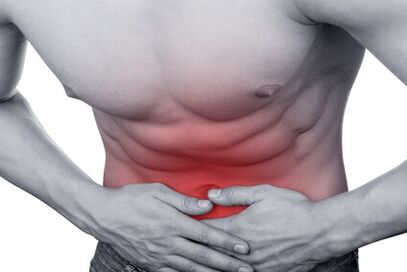
A feeling of superiority and leadership in all areas of activity is very important for every man. It has been proven that it is activity in sex life that directly affects success in any endeavor, and this is only possible with a healthy prostate.
However, if you notice any signs of malfunction of your male organ, you must immediately take appropriate action. So how to treat prostatitis in men, what drugs to use to prevent the transition of the disease into a chronic form?
Proper treatment of prostatitis
A healthy prostate behaves in a fairly disciplined manner, but if inflammation develops inside it, it manifests itself in the form of the following symptoms:
- painful sensations in the pelvic area;
- Disorders of a sexual nature;
- Urinary system disorders - burning sensation, increased urge and various types of difficulty.
Treatment of prostatitis (as well as other diseases of the genitourinary area) should begin as soon as the disease makes itself felt - with pain, symptoms and various unpleasant ailments. Since this is a rather delicate disease, almost every patient is initially faced with the question: "Where is prostatitis best treated in men, which drugs should be used? "
It is impossible to give an unequivocal answer, but it is worth noting that the urological disease in question is complex and only experienced doctors can choose the most appropriate method of therapy. Only a urologist can take into account all the individual characteristics of the patient and aspects of the disease.
Treatment tactics

Treatment tactics are established by both one and more doctors, especially if the disease has complications. So what doctor can help you get rid of prostatitis effectively? First of all, you need to contact a urologist. In addition, in some cases, you will need to bypass some more specialists, such as:
- an immunologist who examines the patient's immune system in detail when the disease has become chronic and is associated with a periodic exacerbation;
- the physiotherapist will prescribe the most appropriate treatment for each case;
- Psychotherapist - creates a mental and emotional balance related to a problem in sex life;
- surgeon - necessary for the development of purulent processes;
Many other specialists are also involved in treatment if the patient has various health problems. Let's take a step-by-step look at how to treat prostatitis.
diagnosis
First, a diagnosis is made, which includes:
- Research in the laboratory.
- Detailed clinical examination.
- Examination of the prostate.
- Uroflowmetry.
- Ultrasonic.
Procedures and rules for the treatment of prostatitis
Having established the form of the course of the disease and the diagnosis, the attending physician draws up a treatment plan that describes the treatment of prostatitis. The extensive program includes:
- physiotherapeutic procedures with laser and magnetic field as well as reflex zone massage, hirudotherapy, ultrasound;
- therapy, use antiviral, antibacterial and other drugs for prostatitis;
- Massage of the prostate, which is carried out by a specialist in a medical institution.
During the treatment of this disease, patients must also adhere to the following rules:
- right nutrition;
- healthy lifestyle;
- Maintaining immunity with multivitamins;
- Exercise.
Therapy of various types of prostatitis
After passing all tests and passing the study, an accurate diagnosis is made. There are several types of this disease. Let's take a look at how each type of prostatitis is treated separately.
- Infectious prostatitis (for example, chlamydia, gonorrhea, etc. ). This form also includes the use of antibiotics, the aim is to kill the focus of infection, and it is also prescribed in a complex of anti-inflammatory drugs and drugs that improve microcirculation. Depending on the pathogen, other means can be used.
- Bacterial prostatitis (caused by staphylococci, streptococci, Pseudomonas aeruginosa, etc. ). This form is accompanied by a frequent process of infection, as well as the presence of inflammatory cells in the prostate. This case is difficult, so repeated courses with antibiotics will not help. The main thing when symptoms appear is to go to the hospital immediately. In this case, you need constant monitoring by a doctor and the implementation of all preventive measures.
When treating chronic prostatitis, the doctor chooses drugs based on the pathogen and the severity of the situation. If the infection is severe, hospitalization with 5 different antibiotics is required. Painkillers are prescribed for acute pain. Prognosis: If the reasons are known and the diagnosis is correct, it is more likely to be positive.
- Congestive prostatitis. It is worth noting that this form requires immediate medical attention due to the dangerous consequences.
Prostatitis: drugs used to treat it
There are many drugs that are recommended for the treatment and prevention of prostate diseases: capsules, tablets, suppositories, injections. Let's look at the main drugs, the method of their use and contraindications.
Suppositories from prostatitis
Agents "Prostate extract" refer to agents that affect the metabolism of the prostate. This will help cure prostatitis, or at least slow it down. Treatment drugs such as "prostate extract" are used for chronic diseases and in the postoperative phase.
Contraindication is hypersensitivity to candles. Method of application: 1 suppository rectally once a day. It is recommended to lie down for 1 hour after administration. The duration of treatment is 5-12 days. Side effect: manifestations of allergies (itching and burning).
Prostate injections
Drugs "Prostate Extract" belongs to the category of drugs that increase the activity of the prostate. In addition, the drug strengthens the vascular wall and activates the immune system. It is used in cases of severe urinary retention, prostate adenoma and if there is evidence of chronic prostatitis.
Treatment drugs, such as "prostate extract", are often used, 6-10 mg injected intramuscularly. The course lasts five days, a maximum of ten. The bottle contains water-soluble peptides isolated from the organs of animals with large horns. To dissolve the contents of the bottle, use 1-3 ml of saline or special water for injections. A second course is allowed in two weeks or a month later. Side effects: no. The lyophilized powder should be stored in a dark place at a temperature not higher than + 21 ° C.
Tablets for prostatitis
Tablets with a complex of proteins and nucleoproteins obtained from the prostate of cattle. The pharmacological effects of the drug for the treatment of prostatitis are as follows: restoration of sexual function, normalization of urination.
Tablets for prostatitis are taken 10-20 minutes before meals for 0, 01-0. 02 g twice a day, the course lasts 10-12 days. No contraindications and side effects were found. Six months later, you can repeat the course and still overcome prostatitis. Treatment and prevention drugs are also made in capsules.
The drug "creeping fruit extract of palm trees"
Regulates reproductive and urinary functions. It contains: coloring agent, gelatine, fruit extract from Serenoa repens, glycerine. This drug is anti-inflammatory and antiandrogenic. Thanks to prostaglatin, anti-prostatitis drugs reduce the swelling of the glandular tissue. The drug is used as a complex treatment.
Contraindications: sensitivity to drug components. Side effects: manifestations of allergies, rarely abdominal pain. Capsules are taken orally, after eating, swallowing and drinking water. The dose is 300 mg per day and they must be taken at the same time. The duration of therapy is determined by the doctor.
A drug that renews urodynamics and improves metabolism in the prostate pro
The ingredients are glycine, copper, zinc, L-glutamine, vitamin E and L-alanine. It is made on the basis of natural substances: dwarf palm berries, pumpkin seeds, Icelandic moss and others.
A drug is used for the prevention and treatment of the genitourinary system, as well as complex therapy. Hypersensitivity to the components of the drug is considered a contraindication. It is taken 2 times a day with meals, 1 capsule inside.
Prostatitis prevention: medication
Developed by a US laboratory. As a basis, the recipes of traditional medicine are used. It contains plant extracts that are widely used in the treatment of diseases of the genitourinary tract. Regular use of an agent for prostatitis activates the immune system and increases the protective properties of the body, as a result of which the immune system independently begins to fight the infection of the genitourinary system, not only eliminating the symptoms of the disease, but also killing the focus of the disease itself. There are no contraindications.
Once your diagnosis is well established, that's half the battle because procedures, pills, drugs, and drugs for prostatitis aren't difficult to buy. Do not forget about a well-thought-out scheme for their use.
How to treat prostatitis yourself
It should be noted immediately that it is very important to self-treat prostatitis, relying on the advice of friends and acquaintances and advertising. It must be understood that the treatment of prostatitis (patient reports confirm this fact) is not an easy matter and can only be defeated through the combined efforts of the doctor and patient. To speed up the treatment process and alleviate the exacerbation, you can resort to alternative methods. But before that, it is imperative to speak to the urologist about how to treat prostatitis at home. Perhaps the doctor will recommend some herbs, procedures, and manipulations.



























